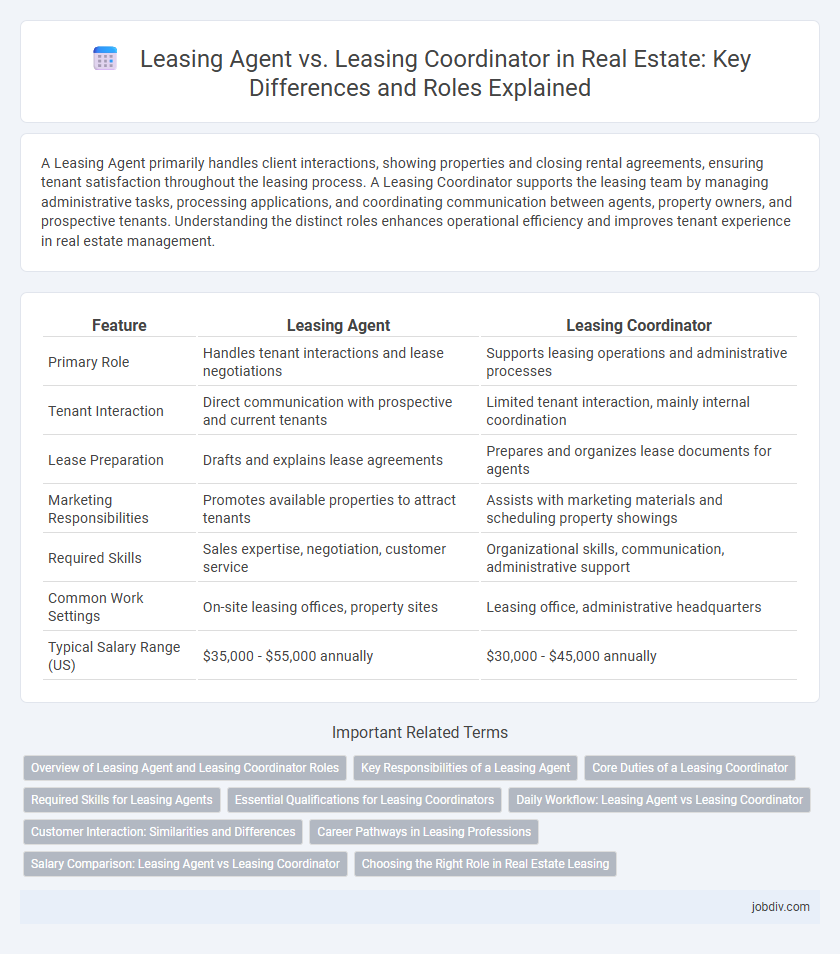A Leasing Agent primarily handles client interactions, showing properties and closing rental agreements, ensuring tenant satisfaction throughout the leasing process. A Leasing Coordinator supports the leasing team by managing administrative tasks, processing applications, and coordinating communication between agents, property owners, and prospective tenants. Understanding the distinct roles enhances operational efficiency and improves tenant experience in real estate management.
Table of Comparison
| Feature | Leasing Agent | Leasing Coordinator |
|---|---|---|
| Primary Role | Handles tenant interactions and lease negotiations | Supports leasing operations and administrative processes |
| Tenant Interaction | Direct communication with prospective and current tenants | Limited tenant interaction, mainly internal coordination |
| Lease Preparation | Drafts and explains lease agreements | Prepares and organizes lease documents for agents |
| Marketing Responsibilities | Promotes available properties to attract tenants | Assists with marketing materials and scheduling property showings |
| Required Skills | Sales expertise, negotiation, customer service | Organizational skills, communication, administrative support |
| Common Work Settings | On-site leasing offices, property sites | Leasing office, administrative headquarters |
| Typical Salary Range (US) | $35,000 - $55,000 annually | $30,000 - $45,000 annually |
Overview of Leasing Agent and Leasing Coordinator Roles
Leasing agents primarily handle direct interactions with prospective tenants, conducting property showings, processing rental applications, and negotiating lease agreements to secure tenants for residential or commercial properties. Leasing coordinators focus on administrative support tasks such as managing lease documentation, coordinating maintenance requests, and ensuring compliance with leasing policies to facilitate smooth property management operations. Both roles are essential in the real estate leasing process, with agents driving tenant acquisition and coordinators optimizing backend leasing activities.
Key Responsibilities of a Leasing Agent
A Leasing Agent primarily handles property showings, tenant screening, and lease negotiations to secure new renters quickly and efficiently. They cultivate strong client relationships and provide detailed information on property features, rental terms, and community amenities. Their proactive approach in marketing vacancies and responding to inquiries directly impacts occupancy rates and rental income.
Core Duties of a Leasing Coordinator
Leasing coordinators primarily manage property listings, schedule tenant showings, and handle lease documentation, ensuring a smooth leasing process. They act as the liaison between leasing agents and property management to streamline communication and maintain tenant relations. Coordinators also oversee application processing and coordinate maintenance requests, enhancing overall operational efficiency.
Required Skills for Leasing Agents
Leasing agents require strong interpersonal and negotiation skills to effectively interact with prospective tenants and close rental agreements. Proficiency in property management software and a solid understanding of leasing laws and market trends are essential for accurate lease preparation and compliance. Additionally, leasing agents must possess excellent communication skills to provide clear information about property features and resolve tenant inquiries promptly.
Essential Qualifications for Leasing Coordinators
Leasing coordinators require strong organizational skills, excellent communication abilities, and proficiency in property management software to effectively support leasing agents and manage tenant relations. They must possess knowledge of lease agreements, local housing laws, and fair housing regulations to ensure compliance and accurate documentation. Experience in customer service and multitasking within real estate environments is essential for coordinating lease applications, renewals, and maintenance requests efficiently.
Daily Workflow: Leasing Agent vs Leasing Coordinator
Leasing agents primarily engage in tenant interaction, property showings, and lease negotiations, focusing on converting inquiries into signed leases through direct communication and follow-ups. Leasing coordinators handle administrative tasks such as processing applications, preparing lease documents, and coordinating maintenance requests, ensuring smooth operational flow and compliance. The daily workflow of leasing agents is client-facing and sales-driven, while leasing coordinators manage backend support and organizational logistics.
Customer Interaction: Similarities and Differences
Leasing Agents and Leasing Coordinators both play crucial roles in managing customer interactions within real estate, with Leasing Agents primarily responsible for conducting property tours, handling inquiries, and closing leases directly with potential tenants. Leasing Coordinators focus more on supporting the leasing process by managing communications, scheduling appointments, and coordinating paperwork to ensure a smooth customer experience. While both roles require strong interpersonal skills and customer service expertise, Leasing Agents engage more in face-to-face interactions, whereas Leasing Coordinators excel in behind-the-scenes communication and administrative support.
Career Pathways in Leasing Professions
Leasing agents focus on direct tenant interactions, property showings, and contract negotiations, developing strong sales and customer service skills critical for advancing to property management roles. Leasing coordinators handle administrative support, lease documentation, and coordination between tenants and property managers, building organizational and communication expertise that opens pathways to office management or operations positions. Both roles provide foundational experience in leasing professions, with distinct career trajectories towards either frontline leasing management or strategic administrative leadership.
Salary Comparison: Leasing Agent vs Leasing Coordinator
Leasing agents typically earn an average salary ranging from $35,000 to $50,000 annually, reflecting their direct client interaction and sales responsibilities. Leasing coordinators often earn between $30,000 and $45,000 per year, with salaries influenced by administrative duties and support roles within property management teams. Salary variations depend on factors such as location, experience, and the size of the real estate portfolio managed.
Choosing the Right Role in Real Estate Leasing
Leasing agents directly interact with prospective tenants, showcasing properties and negotiating lease terms to maximize occupancy rates. Leasing coordinators handle administrative responsibilities, managing lease documentation, tenant communications, and ensuring compliance with legal requirements. Selecting the appropriate role depends on your strengths in client engagement versus organizational skills within real estate leasing operations.
Leasing Agent vs Leasing Coordinator Infographic

 jobdiv.com
jobdiv.com